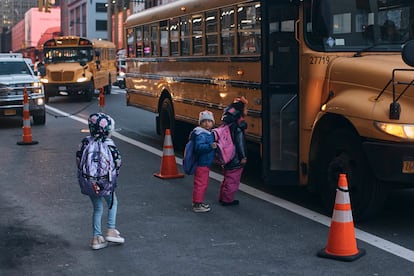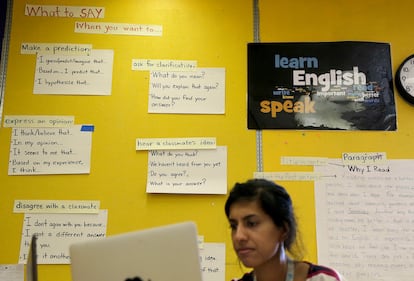Republican offensive opens new fronts against undocumented immigrants in health and education
Texas will require hospitals to report the immigration status of patients and Oklahoma wants to assess the cost of educating children who lack legal residency


Several Republican states have stepped up their campaigns against immigrants who lack legal documents to reside in the United States and are threatening their most basic needs. Until now, migrants in the U.S. did not have to declare their immigration status in order to access medical care in hospitals or for their children to attend school. In the past week, however, two proposals from two Republican-run states have come to light that would end that right to anonymity.
Under the proposals, in Texas hospitals will be obliged to report the immigration status of the patients they treat while in Oklahoma a way to assess the cost of undocumented migrants to the education system is being considered, with the state government expected to force students to reveal whether or not they have legal residency. Although the measures are being justified with other arguments, this latest offensive against migrants follows in the wake of the Republican discourse to put an end to irregular immigration and carrying out the largest mass deportation in U.S. history, one of the banner electoral promises of presidential candidate Donald Trump.
Texas Governor Greg Abbott has signed an executive order that will force hospitals to ask patients whether or not they are U.S. citizens, and whether or not they have a residency permit. In addition, healthcare facilities will have to inform the authorities of the costs involved in the hospitalization of these patients and the medical treatments received. This is the latest attack by the Republican governor against migrants. On August 13, Abbott announced the installation of more barbed wire fences in the Eagle Pass border area.
“Increased expenditures for Texas hospitals providing medical care to individuals who are not lawfully present in the United States imposes burdens on the Texas healthcare system,” Abbott stated in the order, signed on August 8. The expense that migrants represent to the public coffers has been a recurring argument among conservatives, despite statistics that show the benefit they bring to the economy is greater, among other reasons because of the jobs they fill and the taxes they pay. Studies have revealed that undocumented migrants pay more into the Social Security system through their taxes than they use, because they visit the doctor less frequently than Americans.
Once hospitals report, on an annual basis, the cost of hospital and emergency care for undocumented migrants, Texas will seek reimbursement from the federal government. “Texas will hold the Biden-Harris Administration accountable for the consequences of their open border policies, and we will fight to ensure that they pay back Texas for their costly and dangerous policies,” the governor said.
In a country where private healthcare incurs exorbitant costs, health insurance, if not provided through an employer, is a luxury that few can afford. This is the case for many of the migrants who are in an irregular situation in the U.S. and whose only recourse when they fall ill is hospital emergency rooms. By law, these centers cannot deny medical care to anyone, regardless of whether or not they have papers.

“It’s a new requirement and we’re reviewing it as quickly as possible. Right now, hospitals don’t ask about patient immigration status as a condition of treatment. Hospitals are required by law to provide life-saving treatment to anyone, regardless of ability to pay or status,” the Texas Hospital Association said in a statement through spokeswoman Carrie Williams upon learning of Abbott’s decree.
The most immediate consequence when the rule goes into effect on November 1 is that sick people will not seek the medical care they need for fear of revealing their undocumented status. In theory, hospitals will have to inform them that their data will not be used for any other purpose, but that is hardly credible in a state where the so-called Operation Lone Star against immigration has led to the detention of hundreds of thousands of people. Abbott himself boasted Wednesday on social media that in two years, Texas has detained 517,400 migrants and sent 119,400 to sanctuary cities, largely Democratic strongholds where policies against undocumented immigrants are less repressive.
“They say the information is not going to be used against them but that creates fear in the community, because you can’t trust that the Texas government is not going to use that information against them,” says Adriel Orozco, senior counsel for the American Immigration Council, an organization dedicated to migrant advocacy. “People are not going to get the medical care they need. In Florida, they already passed a law and many have not gone to the hospital. In Texas, the same thing is going to happen.”
Florida’s Republican governor, Ron DeSantis, passed legislation in 2023 that requires hospitals to ask patients for their immigration status. In theory, the rule only applies to hospitals that provide Medicaid, but the reality is that it has been extended to more centers and many patients have not sought medical assistance for fear of being detained and deported.

Identification to attend school
In the same anti-immigrant spirit, Oklahoma Superintendent of Public Instruction Ryan Walters wants to impose similar restrictions in his state. At the monthly meeting of the State Board of Education, Walters announced last week that he plans to ask school administrators to help his office calculate “the cost and burden” of illegal immigration in their districts. “The federal government has failed to secure our borders, our schools are suffering over this and where the federal government has failed to act, Oklahoma will step up,” he said.
Walters, who has also tabled a highly controversial proposal to impose Bible study in public schools, did not detail what the measures will be, but everything points to the fact that schools will have to ask about the immigration status of their students. This is despite the fact that the right to primary and secondary education is protected by law in the United States, without discriminating between citizens or non-citizens, and regardless of their papers.
The U.S. Department of Education recalls on its website that “A State may not deny access to public education to any child residing in the State, including children who are not citizens and do not have immigration documentation. The Supreme Court made this clear nearly forty years ago in a case called Plyler v. Doe.” Additionally, in no case can they be asked to disclose whether or not they are legal residents. “School districts may not bar students from enrolling in public elementary and secondary schools based on the citizenship or immigration status of the student or their parent or guardian,” it clarifies.
However, as is the case in Texas, having to define oneself as a migrant without a legal residency permit already points to discrimination within the student community. The most recent data from the Migration Policy Institute estimates that in 2022 there were around 90,000 undocumented migrants in Oklahoma. Of these, 6,000 are under the age of 17 and 89% of them are enrolled in schools.
Sign up for our weekly newsletter to get more English-language news coverage from EL PAÍS USA Edition
Tu suscripción se está usando en otro dispositivo
¿Quieres añadir otro usuario a tu suscripción?
Si continúas leyendo en este dispositivo, no se podrá leer en el otro.
FlechaTu suscripción se está usando en otro dispositivo y solo puedes acceder a EL PAÍS desde un dispositivo a la vez.
Si quieres compartir tu cuenta, cambia tu suscripción a la modalidad Premium, así podrás añadir otro usuario. Cada uno accederá con su propia cuenta de email, lo que os permitirá personalizar vuestra experiencia en EL PAÍS.
¿Tienes una suscripción de empresa? Accede aquí para contratar más cuentas.
En el caso de no saber quién está usando tu cuenta, te recomendamos cambiar tu contraseña aquí.
Si decides continuar compartiendo tu cuenta, este mensaje se mostrará en tu dispositivo y en el de la otra persona que está usando tu cuenta de forma indefinida, afectando a tu experiencia de lectura. Puedes consultar aquí los términos y condiciones de la suscripción digital.








































